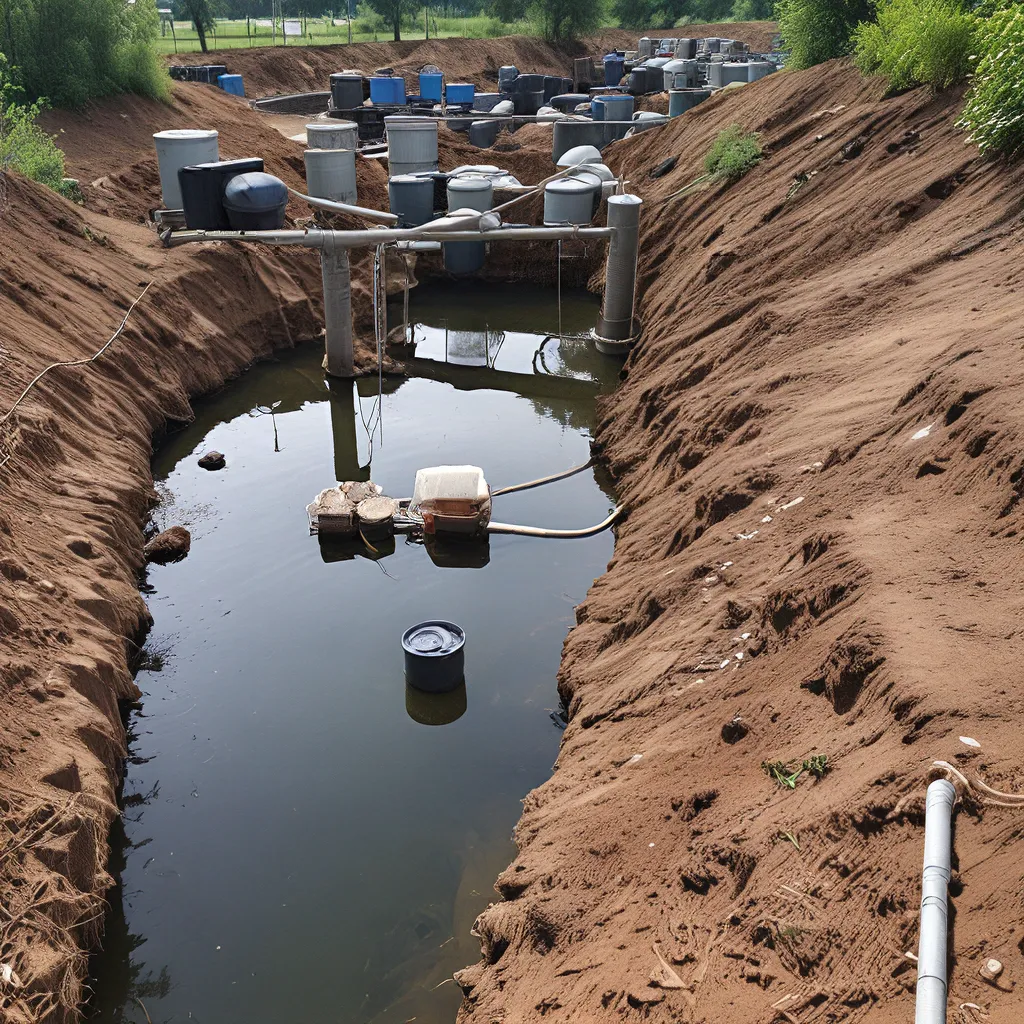
As an avid environmentalist, I’ve always been fascinated by the complex world of wastewater treatment. It’s an industry that’s constantly evolving, grappling with the dual challenges of meeting growing demand and minimizing environmental impact. But what if I told you that the solution could lie in an unexpected place – the sharing economy?
You see, the traditional wastewater treatment model has long been dominated by large-scale, centralized facilities that serve entire communities. But in today’s rapidly changing landscape, this approach is starting to show its limitations. Aging infrastructure, rising costs, and the need for more sustainable solutions have all prompted a rethinking of the status quo.
Enter the sharing economy – a model that has disrupted industries from transportation to hospitality, and now, it’s poised to do the same for wastewater treatment. Imagine a future where decentralized, on-site treatment plants work in tandem, sharing resources and optimizing efficiency. It’s a concept that’s already gaining traction, with innovative startups and forward-thinking municipalities exploring the possibilities.
The Rise of Decentralized Wastewater Treatment
At the heart of this shift is the recognition that centralized treatment plants are often ill-equipped to handle the growing complexities of modern wastewater management. From the challenges of aging infrastructure to the need for more sophisticated treatment techniques, the traditional model is increasingly showing its limitations.
Enter the concept of decentralized wastewater treatment. These smaller, on-site facilities are designed to serve individual buildings, neighborhoods, or even entire communities. By bringing the treatment process closer to the source, they offer a range of benefits, including:
- Improved Efficiency: Decentralized systems can be tailored to the specific needs of the local community, optimizing the treatment process and minimizing waste.
- Enhanced Sustainability: On-site treatment reduces the energy and resources required for transportation, while also enabling the reuse of treated water for non-potable applications.
- Increased Resilience: Decentralized systems are less vulnerable to the disruptions that can plague larger, centralized facilities, ensuring a more reliable and consistent service.
But the real game-changer lies in the potential for these decentralized systems to work together, forming a sharing economy of wastewater treatment.
The Sharing Economy Meets Wastewater Treatment
Imagine a network of decentralized treatment plants, each with its own unique capabilities and resources. By collaborating and sharing information, these facilities can optimize their operations, reducing costs and environmental impact for everyone involved.
For example, a facility that specializes in nutrient removal could share its expertise and technology with a neighboring plant that struggles with this particular challenge. In return, the second facility might offer its superior water reuse capabilities, creating a mutually beneficial exchange.
This collaborative approach also opens the door to innovative financing models. Rather than each facility bearing the full burden of its capital and operational expenses, they can pool resources and share the costs. This not only reduces the financial barriers to entry but also incentivizes the development of more sustainable solutions.
Embracing the Digital Revolution
Of course, the successful implementation of a wastewater treatment sharing economy requires a robust digital infrastructure. Advances in IoT, cloud computing, and data analytics have paved the way for unprecedented levels of connectivity and collaboration.
Imagine a scenario where each decentralized treatment plant is equipped with real-time monitoring sensors, allowing them to share data on water quality, energy consumption, and operational efficiency. This information can then be aggregated and analyzed by a centralized platform, identifying opportunities for optimization and resource sharing.
But the benefits of this digital transformation go beyond just operational efficiency. By leveraging advanced data analytics, these decentralized systems can also anticipate and respond to emerging challenges, whether it’s changes in regulatory requirements, fluctuations in water demand, or the emergence of new contaminants.
Overcoming Barriers and Unlocking Opportunities
I’ll admit, the transition to a sharing economy model for wastewater treatment isn’t without its challenges. There are regulatory hurdles to navigate, infrastructure barriers to overcome, and cultural resistance to change that must be addressed.
But the potential rewards far outweigh the obstacles. By embracing this innovative approach, we can unlock a future where wastewater is no longer a burden, but a valuable resource to be harnessed and shared. Imagine a world where treated water is routinely reused for irrigation, industrial processes, or even groundwater recharge, reducing our reliance on freshwater sources and minimizing environmental impact.
And the possibilities don’t end there. Nutrient recovery and the extraction of valuable materials from wastewater streams could create new revenue streams, transforming the industry from a cost center to a thriving economic engine.
Charting the Path Forward
As I reflect on the future of wastewater treatment, I can’t help but feel a sense of excitement and optimism. The sharing economy model, when combined with the digital revolution, holds the promise of a more sustainable, efficient, and collaborative industry.
Of course, the road ahead is not without its twists and turns. There will be setbacks and challenges to overcome, but I believe that the long-term benefits of this approach make it well worth the effort.
So, what can you do to be a part of this transformative journey? I encourage you to stay informed, engage with industry leaders, and explore the innovative solutions emerging in this space. Who knows, your own insights and contributions could be the key to unlocking the full potential of the wastewater treatment sharing economy.
After all, as the Alpha Wastewater team knows, the future of our water resources is too important to leave in the hands of the status quo. It’s time to think differently, act boldly, and create a more sustainable tomorrow. Are you ready to join the revolution?